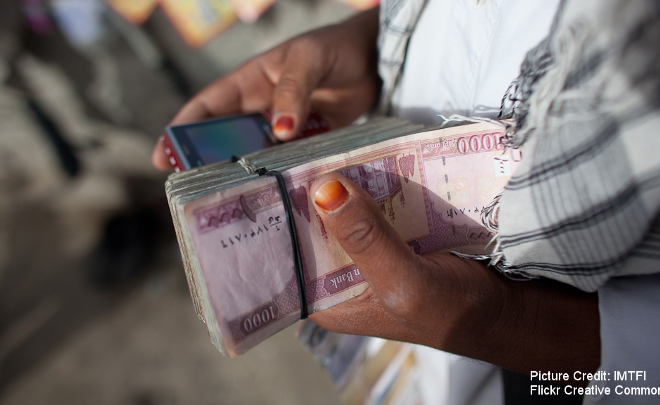Cryptocurrencies: Terrorism’s Next Frontier?

Luc Walter warns of the potential dangers of terrorists utilizing cryptocurrencies to conceal their activities.
At the end of November, it was widely reported that Bitcoin’s value had risen to more than $10,000, an increase of nearly $9000 over the course of 2017. Like other cryptocurrencies, Bitcoin uses decentralized control as opposed to the centralized electronic money and banking systems of regular banks. But while the technology behind these cryptocurrencies seems to be revolutionizing international banking, virtual currencies may also pose acute security risks. Indeed, the fact that cryptocurrencies can offer a high degree of anonymity to the careful user, should be of great concern to security agencies.
Apart from being used as a highly speculative currency, cryptocurrencies can increasingly be used to make purchases, both online and offline. Initially such currencies gained notoriety for the fact that they were being used to purchase illegal goods from marketplaces on the Dark Web. These marketplaces mainly deal in narcotics, but a smaller part of them also offer all sorts of weapons and fake documents.
But while it is known that criminals make use of virtual currencies to conceal their online dealings, it is currently less known if terrorists are also using them. Nevertheless, it is clear that groups such as Islamic State have been very adept at using new technologies and regularly distribute information to followers on how to use these to their advantage, including on the benefits of Bitcoin.
Instead of asking if terrorists might use virtual currencies to their benefit, it might be better to ask why and how they would use them.
A New Tool for Terrorism?
In theory, terrorists could make use of cryptocurrencies to anonymously purchase weaponry, fake documents, and other illegal items. In addition, an increasing number of legal goods and services, which can be used to support their operations, can also be bought by using the digital coin.
Even though using cryptocurrencies to purchase goods and services online enables a degree of anonymity which reduces the chances of being detected, there remains the issue of delivery of items to a real world address. Furthermore, it will probably remain easier to buy the necessary weaponry directly from a criminal contact, especially when purchasing larger numbers.
As such, terrorists might be more interested in the decentralized nature of cryptocurrencies, as this will also affect a government’s ability to freeze assets. Consequently, terrorists on an international blacklist, who are denied access to their known bank accounts, could use virtual currencies to maintain control over their finances as well as transfer or exchange funds with each other.
Hawala 2.0
Exchanging cryptocurrencies between each other can be done by either transferring funds from one wallet to another, or by sharing access to a wallet. The latter option would further complicate detection by financial authorities and counterterrorism agencies. In effect, such a practice would essentially create a digital hawala system.
The hawala system, especially popular in the Middle East, Africa, and Indian subcontinent, is a traditional money transfer system based largely on trust, honor and family ties, allowing for the transfer of cash from one place to another without physically moving the money. Instead, money is paid to a hawala dealer in one place, who will then contact another hawala dealer in the recipient’s country who provides the cash to the recipient. This method is being used by migrants to transmit remittances to their families in their countries of origin. It has also been used by terrorists and has therefore come under the scrutiny of counterterrorism agencies.
With cryptocurrencies, transferring funds could work in a similar fashion. Instead of going to a local hawala dealer, an operative could for example buy Bitcoins from a local Bitcoin trader. Because of their unregulated and decentralized nature, everyone can trade in these digital currencies. To minimize the chances of leaving a digital footprint, which could lead to the identification of the buyer, cash can be used to purchase the Bitcoins. The operative then transfers these Bitcoins to an operative in the West, or shares access to his digital wallet with this person. In turn, this operative, for example in Stockholm, would contact a Bitcoin trader to which he sells his Bitcoins. Again, to ensure leaving a minimal digital trace, the Bitcoins would be sold for cash money.
To date evidence of terrorist use of cryptocurrencies remains limited. But if groups start to use these currencies to finance operations in such a way which leaves minimal digital paper trail, it will be harder for counterterrorism efforts to uncover more sophisticated terrorist plots. This issue becomes all the more pertinent as Islamic State loses ground in Syria and Iraq, which may lead it to increasingly focus on carrying out attacks in the West.
Luc Walter is an intern with ISDP’s Center for Transnational Threats. He is pursuing an MA in International Relations at Leiden University.
Please note: ISDP is not responsible for the content of some of the links contained in this article.